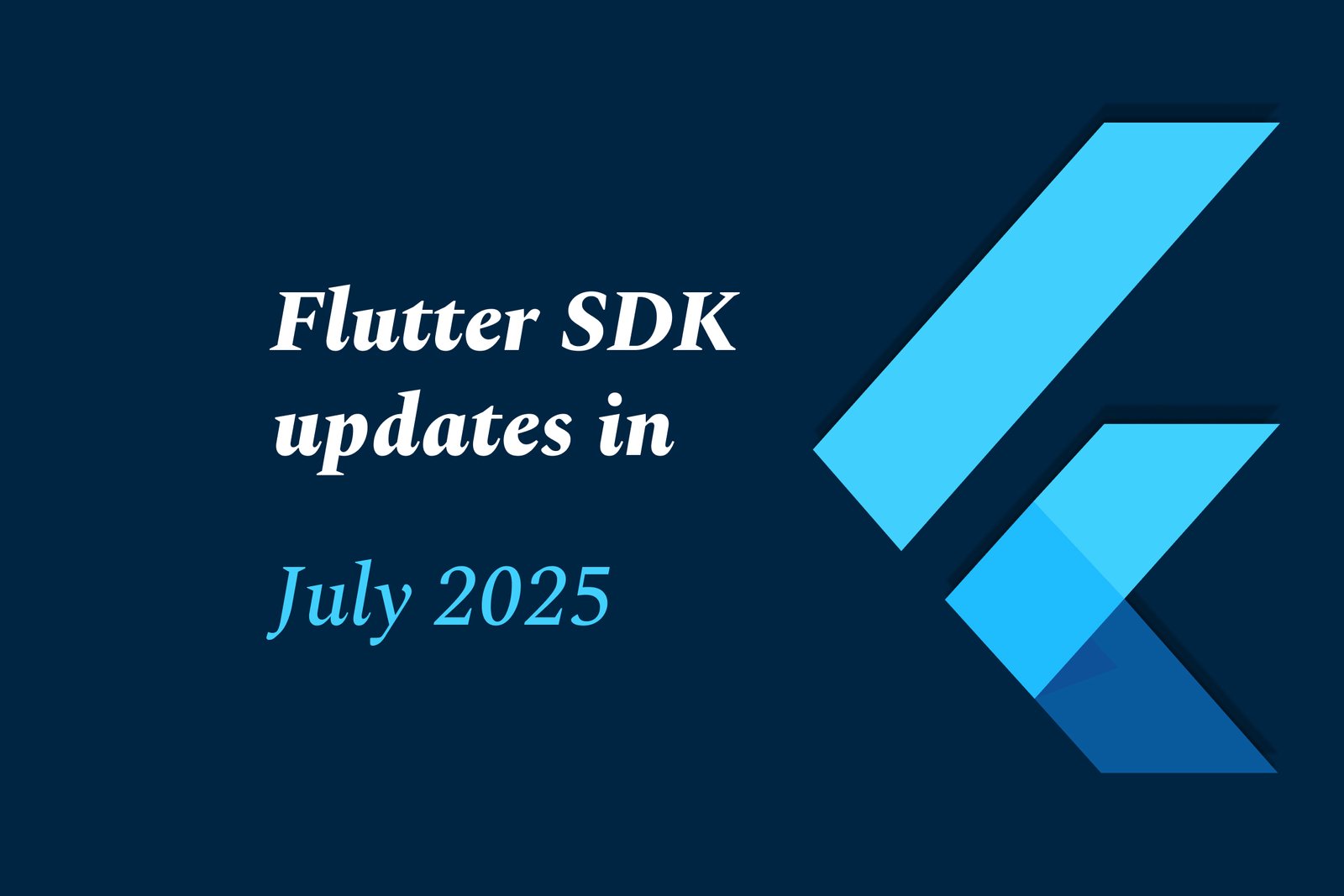Flutter SDK updates in July 2025
The July 2025 Flutter SDK update brings Flutter 3.32.4 integration, enhanced native file editing in FlutterFlow, reusable custom class libraries, AI-powered feature upgrades, improved accessibility, and critical bug fixes—boosting performance and developer productivity.
Flutter SDK Updates in July 2025
1 ) Upgrade to Flutter 3.32.4 in FlutterFlow
FlutterFlow has updated its base Flutter version to 3.32.4.
This release brings major improvements in Flutter and updates dozens of third party packages.
Developers may need to adjust custom code or dependencies, especially for web rendering or older Android embedding.
An experimental wasm toggle is now available in Web Deploy settings for enhanced web app performance.
2 ) Enhanced Native File Editing in FlutterFlow
Users can now directly modify AppDelegate.swift (iOS) and build.gradle (Android) files inside FlutterFlow.
This enables advanced integrations requiring native configuration, such as custom plugin registration, SDK version tweaks, and adding build time dependencies.
These join existing editable files like main.dart and AndroidManifest.xml.
3 ) Custom Classes Shared via Libraries
FlutterFlow introduces Libraries for sharing custom classes—data models, business logic, enums—across projects.
This greatly facilitates code reuse and version control for common components like UserProfile or Product classes.
Enhances scalability and maintainability for teams working on multiple Flutter apps.
4 ) Other Usability and Feature Improvements
Double clicking text elements instantly focuses input box for faster editing.
Updated canvas device options include latest models (iPhone 16, Pixel 9 ).
Collaboration settings now support search, sorting, and filtering for project members.
Project API documentation updated with new endpoints like /listProjects.
AI powered features improved: AI prompts in custom code now access full project variables; AI Agents upgraded to OpenAI’s Responses API and Google Gemini 2.5 stable models.
Show Border on Focus toggle added under Accessibility for keyboard navigation enhancements.
Improved UX flows for branch renaming, project loading, CLI command generation, and library page importing with route conflict resolution.
5 ) Major Bug Fixes
Fixed pixel overflow in property panel, loop handling in action blocks, and commit list display issues.
Resolved bugs impacting builds with dependencies and emoji display in custom code expressions.
Addressed crashes in Windows desktop app loading custom code/webviews.
Corrected data table refresh, action duplicates, and library value resets when managing dependencies.
Fixed authentication action checks and various UI/interaction fidelity problems.
6 ) SDK Upgrades and Related Product Updates
Flutter SDK version 5.1 )0 (July 7, 2025 ) released with upgraded Android SDK (7.10.0 ) and iOS SDK (8.2.0 ).
Multiple prior SDK updates detailed from January through June 2025 introduced bug fixes, proof of address verification feature, NFC improvements, and support for newer Android/iOS versions.
Summary:
July 2025’s Flutter SDK and FlutterFlow updates deliver significant enhancements in core Flutter upgrades, native file editing capabilities, and reusable custom libraries. Alongside numerous workflow improvements, accessibility enhancements, and AI feature upgrades, the release ensures better developer productivity and app performance. Several critical bug fixes and SDK version bumps consolidate the platform’s stability for modern cross platform app development.
https://justacademy.in/news-detail/flutter-roadmap-beyond-2025
https://justacademy.in/news-detail/new-features-in-flutter-4.0-stable
https://justacademy.in/news-detail/what’s-deprecated-in-flutter-2025
https://justacademy.in/news-detail/best-flutter-practices-every-developer-should-follow
https://justacademy.in/news-detail/why-flutter-developers-are-in-high-demand-in-india
Related Posts
In 2025, top Angular libraries offer modern, feature-rich components and tools for building dynamic web apps. From powerful data grids to low-code platforms like UI Bakery, these libraries enhance development speed, UI design, and scalability, making them essential for Angular developers.
Migrating from AngularJS to Angular 17 involves gradually upgrading your app by running both frameworks together using tools like ngUpgrade, rewriting components in TypeScript, and adopting Angular’s modern architecture to enhance performance, maintainability, and long-term support.
Angular state management tools help organize and handle app data efficiently, improving scalability and maintainability. Popular options include NgRx for robust, RxJS-based patterns, and newer Signal Store solutions that offer simpler, reactive approaches integrated tightly with Angular’s latest features.
RxJS in Angular empowers developers to manage asynchronous data streams with powerful operators like `forkJoin`, `combineLatest`, and `zip`. Mastering these key operators in 2025 is essential for building efficient, reactive applications that handle complex event sequences seamlessly.
Angular performance optimization in 2025 focuses on improving app speed and responsiveness by using techniques like OnPush change detection, lazy loading, efficient data caching, and AOT compilation. These practices reduce load times, enhance user experience, and ensure scalable, fast Angular applications.
In 2025, Angular remains preferred for large-scale, enterprise apps with its robust, all-in-one framework, while Vue attracts developers seeking simplicity and fast development for smaller projects. Both frameworks excel, with choice driven by project needs and team expertise.
Angular Signals are a new reactive primitive in Angular 16 that enable fine-grained, efficient change detection by automatically tracking dependencies and updating only affected parts of the UI. They simplify state management and boost app performance, revolutionizing Angular's reactivity model.
Angular interview questions to prepare in 2025 focus on core concepts like components, directives, data binding, routing, and dependency injection, along with TypeScript mastery and latest Angular features to ensure strong practical knowledge for building scalable, efficient web applications.
AngularJS reached its official end of support in January 2022, meaning no further updates or security patches. To ensure app security and performance, developers should consider migrating to modern Angular versions or seek third-party long-term support options if immediate migration isn’t possible.
The Angular Roadmap 2025 highlights upcoming features focused on improving developer experience and performance, including zoneless Angular, Signals integration, enhanced Forms, async data handling, improved HMR, and expanded Angular Material/CDK enhancements, driving modern, efficient web app development.










